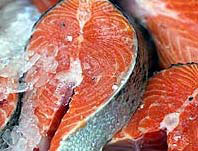Pollutants from fish oil can cause diabetes
 Oily fish such as salmon are susceptible to a group of toxins called POP in the environment. This condition increases the risk of type 2 diabetes.
Oily fish such as salmon are susceptible to a group of toxins called POP in the environment. This condition increases the risk of type 2 diabetes.
POP is the abbreviation for organochlorine toxic group, including polychlorinated biphenyl (PCBs) and DDT pesticides. They are a byproduct of industrial processing and are everywhere. Eating oily fish, such as salmon, can cause POP poisoning.
Dr. Lars Hagmar and colleagues at Lund University in Sweden analyzed blood samples from nearly 200 fishermen and wives to quantify CB-153 (POP residue) and DDE (by-product of DDT). Results showed that 6% of men and 5% of women with diabetes have these two chemicals.
According to some previous studies, toxins such as POP can reduce the cell's ability to absorb glucose, or stimulate a complex series of reactions, disrupting the body's ability to break down fat.
However, the study does not imply a boycott of oily fish, as Hagmar stressed that the study participants were exceptional. They are exposed to pollutants at very high concentrations. In addition, where they make a living - the Baltic coast - contaminated with heavy POP by the industry. Seawater there is also shallow and cold, making pollutants take a long time to decompose. The Baltic Sea is surrounded by land, so the water circulation is relatively low, causing pollutants to become vicious and becoming increasingly concentrated.
My Linh
- Bikini sucks pollutants in seawater
- What is diabetes? Causes and ways to treat diabetes
- Roofs absorb pollutants
- Vaccines for type 1 diabetes will be tested on humans in 2018
- Eating fish may reduce the risk of heart attack in people with type 2 diabetes
- 5 dishes from diabetes room beans
- Diabetic identification signs: Much thirst ...
- Classify 5 diabetes groups for treatment of target
- Diabetes, things you can't ignore
- After you see these signs appear, the risk of diabetes is very high
- People with diabetes should not absolutely abstain from eating sweet
- Vietnam is going to have a diabetes meter without blood injection?
 Green tea cleans teeth better than mouthwash?
Green tea cleans teeth better than mouthwash? Death kiss: This is why you should not let anyone kiss your baby's lips
Death kiss: This is why you should not let anyone kiss your baby's lips What is salmonellosis?
What is salmonellosis? Caution should be exercised when using aloe vera through eating and drinking
Caution should be exercised when using aloe vera through eating and drinking